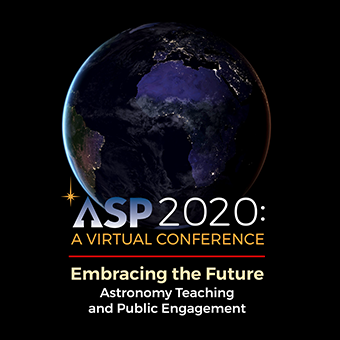Teaching Astro 101 Online: Tips, Tricks, and Lessons Learned
Andrew Fraknoi
Fromm Institute, Univ. of San Francisco
 A group of us who will attend the 3-5 December 2020 virtual meeting of the Astronomical Society of the Pacific (ASP) are organizing a series of panels and short presentations on the challenges of teaching Astro 101 virtually. This will be a group of sessions devoted to progress reports about best practices in online teaching, learning, assessment, and survival.
A group of us who will attend the 3-5 December 2020 virtual meeting of the Astronomical Society of the Pacific (ASP) are organizing a series of panels and short presentations on the challenges of teaching Astro 101 virtually. This will be a group of sessions devoted to progress reports about best practices in online teaching, learning, assessment, and survival.
We invite you to join us by sharing your knowledge or experience, or simply by listening and joining in the session discussions. A modest number of scholarships covering the registration fee will be available for instructors (including part-timers) in community colleges and other institutions that do not have professional development funds.
The thread will be divided into the following six main topics:
1. Running Your Class Online
- Guidance for how to get your class online now
- Norms for online classrooms
- What active learning looks like online (both synchronous and asynchronous)
- Tricks and tips on Zoom, Canvas, and other platforms
- Accessibility and diversity issues
- Seeing to the mental health of students and instructors
2. Astronomy Labs Online
- Virtual lab activities: what works, what doesn’t
- Use of robotic telescopes
- Virtual environments that permit lab experiences
3. Online Assessment
- What else can you do besides old-fashioned testing?
- Frequent, flexible mastery quizzes or higher-stakes exams?
- Secure testing, cheating sites, and electronic tools
- Equity in grading
- How do you assess how you are doing as an instructor?
4. Observing Sessions, Campus Planetarium, Student Citizen Science, etc.
- Virtual observatories or star parties
- Virtual or distanced planetarium visits
- Authentic student research opportunities
5. Students Working in Small Groups
- Breaking up is not hard to do: tools and tips
- Asynchronous and synchronous group projects, discussions
6. Resources for Virtual Learning and Teaching
- Online books and other tools
- Simulations and where to find them
- Useful apps and websites for Astro 101
Some panelists and presenters have already been selected, but there is still time available to contribute to any of these six topics. If you’d like to present, we ask that you submit an abstract; be sure to read the guidelines about abstract submissions.
In your abstract, please tell us...
- that you want to be part of the Astro 101 thread;
- which of the six main topics (above) you want to be grouped under;
- whether you’d like to be part of a panel (50-minute topical session) or do a short presentation (10-minute oral). Short oral presentations will be grouped into sessions with others tackling similar topics.
You don’t need to be a world-class expert to contribute. If you have useful experience about things that worked or things to avoid in online teaching, consider sharing it with your peers.
If you have questions about the meeting program for this thread, please email Andrew Fraknoi. Questions about meeting logistics should be directed to the ASP2020 meeting organizers.

